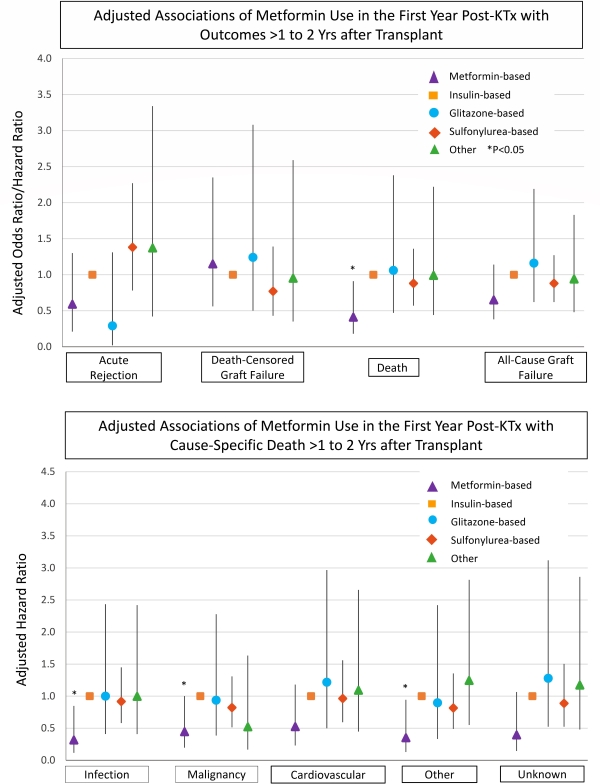Metformin Use after Kidney Transplantation: A Safe Option in Carefully Selected Patients
F. Koraishy,1 L. Vest,1 Z. Zhang,1 M. Schnitzler,1 V. Dharnidharka,2 D. Axelrod,3 R. Ouseph,1 A. Naik,4 N. Lam,5 H. Randall,1 T. Alhamad,2 D. Segev,3 D. Brennan,3 B. Kasiske,6 G. Hess,7 K. Lentine.
1Saint Louis Univ, St. Louis
2Washington Univ, St. Louis
3Lahey Clinic, Burlington
4Univ Michigan, Ann Arbor
5Univ Alberta, Edmonton
6Johns Hopkins, Baltimore
7Hennepin County, Minneapolis
8Symphony Health, Conshohocken.
Meeting: 2018 American Transplant Congress
Abstract number: 140
Keywords: Kidney transplantation, Metabolic complications, Mortality, Outcome
Session Information
Session Name: Concurrent Session: Kidney: Cardiovascular and Metabolic - 1
Session Type: Concurrent Session
Date: Sunday, June 3, 2018
Session Time: 4:30pm-6:00pm
 Presentation Time: 4:54pm-5:06pm
Presentation Time: 4:54pm-5:06pm
Location: Room 303
Recent guidelines support metformin as a therapeutic option in diabetic patients with mild to moderate renal insufficiency. The frequency and outcomes of metformin use in kidney transplant (KTx) recipients are not well described.
We integrated SRTR registry data with diabetes mediation fill records from a large pharmaceutical claims warehouse (2008-2015). Associations (adjusted hazard ratio, 95% LCLaHR 95% UCL) of diabetes regimens (with and without metformin) in the first-year post-transplant with patient and graft survival over the subsequent year were quantified by multivariate Cox regression including adjustment for recipient, donor and transplant factors, and propensity for metformin use.
Among 14,144 type 2 diabetic KTx recipients in the linked database, 4.7% filled metformin in the first-year post-KTx. Compared to insulin-based regimens (excluding metformin), those who received metformin were more likely to be female (adjusted odds ratio [aOR] 1.27), have discharge estimated glomerular filtration (eGFR) >60 (vs 30-60 ml/min per 1.73m2, aOR 1.35) and be transplanted more recently, and were less likely to have received expanded criteria deceased donor allografts (aOR 0.64). Metformin-based treatment was associated with significantly lower adjusted all-cause (aHR 0.180.410.91), malignancy-related (aHR 0.450.451.00), and infection-related (aHR 0.120.200.85) mortality and a non-significant trend towards lower cardiovascular mortality compared to insulin-based therapies. There was a non-significant trend towards lower risks of graft failure and acute rejection in the metformin group, but no evidence of increased adverse graft or patient outcomes.
Metformin-based diabetes treatment regimens may be safe in carefully selected KTx recipients.
CITATION INFORMATION: Koraishy F., Vest L., Zhang Z., Schnitzler M., Dharnidharka V., Axelrod D., Ouseph R., Naik A., Lam N., Randall H., Alhamad T., Segev D., Brennan D., Kasiske B., Hess G., Lentine K. Metformin Use after Kidney Transplantation: A Safe Option in Carefully Selected Patients Am J Transplant. 2017;17 (suppl 3).
To cite this abstract in AMA style:
Koraishy F, Vest L, Zhang Z, Schnitzler M, Dharnidharka V, Axelrod D, Ouseph R, Naik A, Lam N, Randall H, Alhamad T, Segev D, Brennan D, Kasiske B, Hess G, Lentine K. Metformin Use after Kidney Transplantation: A Safe Option in Carefully Selected Patients [abstract]. https://atcmeetingabstracts.com/abstract/metformin-use-after-kidney-transplantation-a-safe-option-in-carefully-selected-patients/. Accessed February 16, 2026.« Back to 2018 American Transplant Congress

